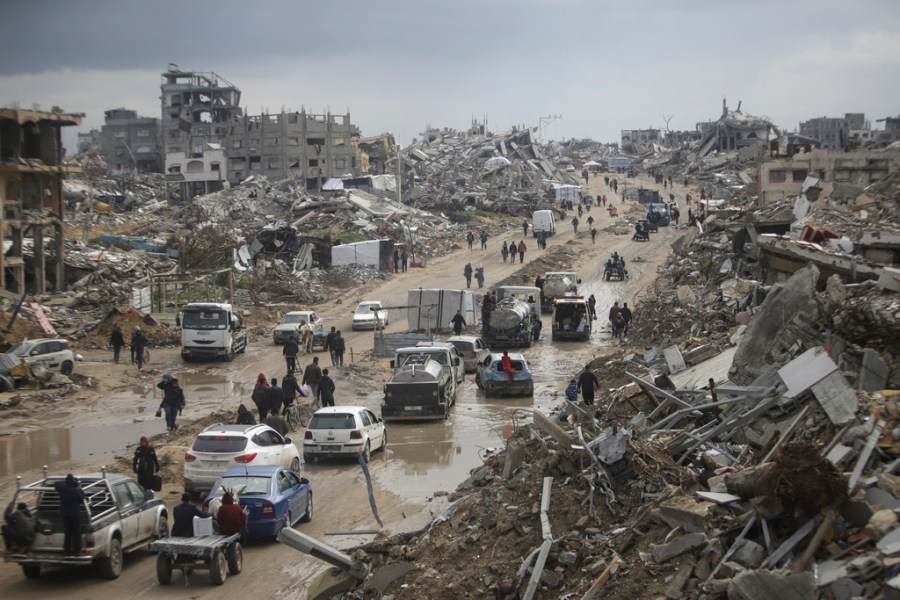
Twenty years ago, I sat with Gen. Omar Suleiman in the headquarters of the Egyptian General Intelligence Service in Cairo. We discussed a trilateral land swap between Egypt, Israel and the Palestinians. The logic behind the plan was the same as that of President Trump’s recent comments. Only now, the urgency for its implementation is clear to the world.
The rulers and borders between Egypt, Gaza and Israel have changed many times over the last hundred years. From the Ottomans to the British, from the Egyptians to the Israelis, from the Palestinian Authority to Hamas, this small strip of land has never known quiet — and it will never allow others quiet until its inhabitants have a vision of peace and prosperity. Trump has provided just that.
Today, Gaza is a terrorist’s dream. There are hundreds of kilometres of underground tunnels in which they can hide themselves and hostages. Meanwhile, the Gazan population is left exposed and vulnerable above ground.
How does Trump’s vision change this? This is not about sending the Gazan population into Egypt, but rather about adjusting the borders of Egypt, Gaza and Israel to benefit all sides.
The Gaza strip would be expanded down to El Arish in northern Sinai, doubling its land mass to 800 sq. km. Egypt would see a land crossing from Sinai to Jordan, while Israel would annex its main population centres and areas of critical security in Judea and Samaria.
The Egyptians would leverage a resource of which they have excess for a resource they are lacking. Ninety-eight percent of Egypt’s huge 120 million population currently lives on 3 percent of Egypt’s land, along the Nile delta. But they have thousands of kilometers of coastal land. What they lack is access to foreign capital. Thanks to the Russian invasion of Ukraine, they lack wheat to feed themselves, and Houthi terrorism is now reducing their income from the Suez Canal, approximately 2 percent of Egyptian GDP.
Furthermore, too many Egyptian pilgrims drown in boats crossing to Saudi Arabia to make the Hajj, the pilgrimage to Mecca. A land crossing from Sinai to Jordan would save lives and realize that little known clause in the Israeli-Egyptian peace agreement that is yet to be implemented.
There are precedents for this. In 1965, Saudi Arabia and Jordan exchanged land from Aqaba to Iraq to align interests. More recently, in 2017, Egypt transferred the ownership of two islands, Tiran and Sanafir, to Saudi Arabia in return for billions of dollars. This is a model for what can and must be done with Gaza.
For the Palestinians, expanding the Gaza strip down to El Arish will give them new homes, extra fishing rights and a deep sea port. They will connect into the Indian Middle Eastern Economic Corridor, benefiting from trade, tourism, oil and gas. Most importantly, they will be focussing on their future rather than dreaming of a disappeared past.
This is not ethnic cleansing, as some have said. This would be moving the population a hundred miles down the road to a better future.
Gaza cannot be rebuilt under current conditions. For two decades Hamas has invested billions of Qatari, American and European money in building terror tunnels underground rather than housing and offices above ground. As someone who works in the construction industry, I know how difficult it is to build above the underground in London or the metro in New York. You cannot insert the deep piles required for tall buildings. Greater Gaza will enable this future.
For Israel, this will facilitate the international recognition of Israeli sovereignty in Ariel, Gush Etzion and major Jewish population areas as well as the Jordan Valley. The latter is critical to prevent the infiltration of terrorists across the Jordan river. A multinational landswap will enable full normalisation in the Middle East and expediate the implementation of the Indian Middle Eastern Economic Corridor.
For the U.S., this will increase regional stability but offers something more. Currently, America’s main military base is in Qatar. Trump could replicate or move this base to Gaza, gaining a stronghold in the Eastern Mediterranean, similar to that of the UK army in Cyprus. Since America is the main military ally of both Egypt and Israel, and will ultimately be the guarantor of Palestinian security, this will be welcomed by all.
Finally, the wider Middle East, Europe and the world will benefit from a bit of quiet in this area. Long-term stability and investment will replace decades of terror and despair. The U.S. has shown its trump card. Let’s see how the others respond.
Terry Newman is an entrepreneur, investor and geopolitical strategist who has lived in both Egypt and Israel. He has previously served as a chief of staff to Lord Janner in the UK House of Lords.












